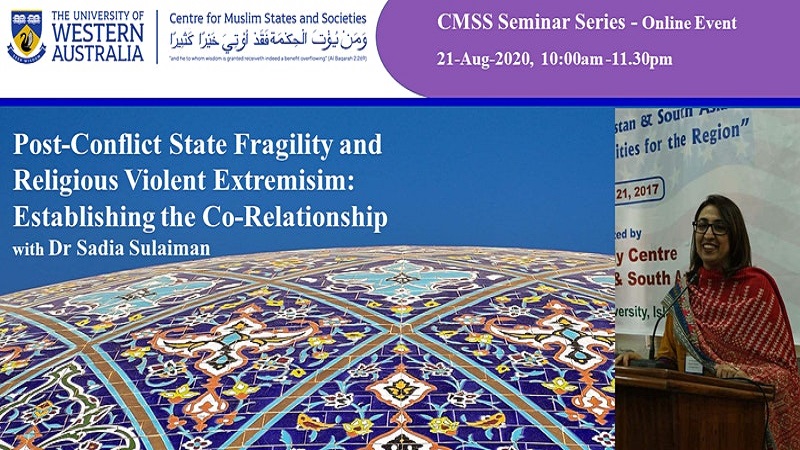Post-Conflict State Fragility and Religious Violent Extremism
Date and time: Friday, August 21, 2020, 10 to 11:30 am Australian Western Standard Time (UTC+8)
Register here.
The Centre for Muslim States and Societies, University of Western Australia presents: Dr Sadia Sulaiman – Post-Conflict State Fragility and Religious Violent Extremism: Establishing the Co-Relationship
A phenomenal growth in religious extremism amidst violent conflicts around the world could be explained by the existence of an enabling environment that facilitates the extremists to exploit it in their own favor. Countries affected by conflicts pay a heavy price in the shape of crumbling physical infrastructure, sluggish economic growth, political instability, fractured societies and a weak rule of law. The situation is more pronounced in countries with inherent structural fault lines that have further exacerbated the existing volatile situation. The state’s weaknesses and its fragility have thus become a core issue, which needs to be dealt with adequately, particularly in a post-conflict milieu, to avoid extremism, apart from other threats. The issue gets further complicated since many states do not accept ‘fragility’ as a reality, which further results in the state’s weakness and its waning writ over its resources. This discussion emphasizes that the state fragility is a stark reality that gets worsened in a post-conflict situation, as evident from the international community’s focus on state-building and nation-building as a path to recovery from conflict. This talk will dilate upon why and how various countries get trapped into fragility and provide an enabling environment for violent religious extremism to further aggravate the situation. How the presence of certain security, political, socio-economic and external factors contribute to state fragility, thereby paving the way for the extremists to reap from the situation. It will discuss the co-relationship between state fragility and religious extremism in a post-conflict setting in the context of Afghanistan, Iraq, Yemen, Nigeria, Libya and Pakistan.
About the Speaker
Dr Sadia Sulaiman
Assistant Professor, Area Study Centre for Africa, North & South America Quaid-e-Azam University, Islamabad
Private Consultant on Conflict & Post-Conflict Reconstruction & Stabilization with UNDP, DFID, GIZ Germany, Kings College London (KCL), FATA Study Cell, University of Peshawar, Pakistan; FATA Research Centre (FRC), Islamabad, Coffey International and Society for Skill Training and Development (SSTD), Pakistan.
Research Interests & Expertise
Countering terrorism and violent extremism, insurgencies and counter-insurgencies; Asymmetric and emerging security threats; Armed conflicts, social grassroots movements, Non-State Armed Groups and Illicit Networks; Transnational threats, organized crime and counter-terror financing; Political and conflict economy; Women, peace and conflict; State and Peacebuilding in fragile states; Security Sector Reform; Non-traditional security threats in South Asia; Post-conflict stabilization; Strategic Communications; Conflict Resolution; Politics of South Asia; Foreign Policies of Great Powers, especially the US, toward South and Central Asia, esp Afghanistan and Pakistan. Dr Sulaiman has conducted field research in Afghanistan and Pakistan’s conflict areas like the Federally Administered Tribal Areas (FATA), Balochistan and Pakistan-administered Azad Jammu & Kashmir (AJK). She is native of the Pak-Afghan border area and Pashtun by ethnicity.
Academic Qualifications
PhD in Strategic Studies 2007-2014, RSIS, Nanyang Technological University, Singapore
Thesis Title: Resurgence of the Taliban in Afghanistan: Role of Post-Conflict Reconstruction
Supervisors: Prof C Raja Mohan, Prof Rajesh Basrur & Assoc Prof Ahmad Saleh Hashim
M.Phil in Defence and Strategic Studies
2000-2003, Quaid-i-Azam University (QAU), Islamabad
Thesis Title: Threat of nuclear Proliferation from former Soviet Central Asian States
Supervisor: Prof Pervez Iqbal Cheema
M.A. in International Relations (Gold Medal)
1998–2000, University of Peshawar, Pakistan
Professional Experience
February 2003-to date. Assistant Professor, Area Study Centre, Quaid-e-Azam University (QAU), Islamabad
April 2016 –February 2017. Advisor, FATA Research Centre, Islamabad
July 2007 – February 2013. Senior Research Analyst and Acting Head Terrorism & Insurgency Unit (TIRU), Thomson Reuters, Singapore
June 2001-January 2003. Research Fellow, Institute of Strategic Studies, Islamabad (ISSI), Pakistan
September 2003 – to date. Visiting Faculty, International Islamic University, Islamabad (IIUI); University of Peshawar; Foreign Service Academy (FSA), Islamabad; Intelligence Bureau Academy (IBA), Islamabad
Recent Publications
– Book “Post-Conflict Reconstruction: From Extremism to Peaceful Co-Existence” SAGE, July 2020
– Adelphi Book: “Mainstreaming of Former FATA: Breaking the Conflict Trap”, IISS, Forthcoming
– “Governance Reforms in FATA: A People’s Perspective”, FATA Research Centre (Islamabad), 2017
– “FATA Context Analysis”, DFID and Coffey International, October 2016
– “The Swat Conflict: An Arc of Instability Spreading from Afghanistan to Central Asia and Xinjiang”, Terrorism Monitor, Jamestown Foundation, Washington DC, US, Vol. 7: Issue 9, 2010
– “Making Money in Mayhem: Funding the Taliban Insurrection in Pakistan’s Tribal Areas”, Studies in Conflict and Terrorism Journal, Volume 32, Issue 2, January-February 2009
– “Empowering “Soft” Taliban over “Hard” Taliban: Pakistan’s Counter-Terrorism Strategy”, Terrorism Monitor, Jamestown Foundation, Washington DC, US, Vol. 6: Issue 15, July 2008.
Selected Training
Plowshares Collaborative on “Transforming a Violent World: Sharing Resources, Tools, and Visions” June 27 – July 2, 2004, Goshen College, Indiana, USA
International Studies Summer Institute, July 11 – July 24, 2004, Centre for the Study of Global Change, Indiana University, Bloomington, USA
2004 Fulbright Scholar American Studies Institute, University of Delaware, Newark, USA


